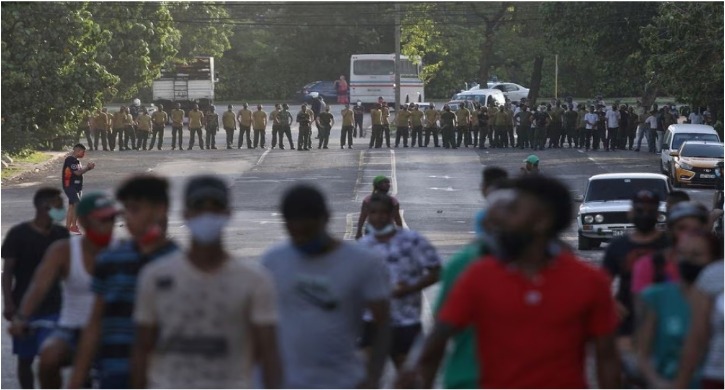
Cuba has accused the U.S. government of playing a direct role in the major protests that took place on the island two years ago. In an editorial published by the Communist Party-run Granma newspaper, the U.S. was blamed for the disturbances that occurred on July 11 and 12, 2021, without presenting any evidence to support the claims.
According to Granma, the U.S. openly encouraged people and provided them with financial support to engage in unlawful activities, including robbery and assault. The editorial also accused the U.S. of spreading disinformation and slander through social media platforms. These actions were portrayed as part of a strategy to maintain the U.S. policy of maximum pressure against Cuba, which was initially established during the administration of Donald Trump and continued under President Joe Biden.
During the protests in July 2021, thousands of Cubans across nearly 50 cities demanded freedom and voiced their frustration with the deepening economic crisis, the most severe in three decades. Scarce access to food, transportation, fuel, and medicine fueled the unrest. Since October 2021, over 140,000 Cubans have migrated to the United States due to the dire economic conditions.
Cuban authorities responded swiftly to the protests, imposing harsh measures and sentencing hundreds of individuals to prison on charges ranging from public disorder to sedition. The U.S. State Department denied any involvement in the 2021 protests and called for the immediate release of approximately 700 Cuban political prisoners. The European Union echoed these concerns, urging Cuba to release the detained protesters and address human rights issues.
Arturo Lopez-Levy, a foreign relations expert, commented on the editorial, stating that it reflects the strained relations between the U.S. and Cuba, with no visible progress made in reducing tensions. He highlighted that releasing the prisoners would be a challenging task as long as the U.S. maintains hostile policies on critical matters.
On the anniversary of the protests, some Cuban emigrants called for commemorative events. However, the streets of Havana remained calm, with an increased presence of plain-clothed security officials in certain areas. The situation serves as a reminder of the ongoing tensions and political complexities that shape the relationship between Cuba and the United States.
